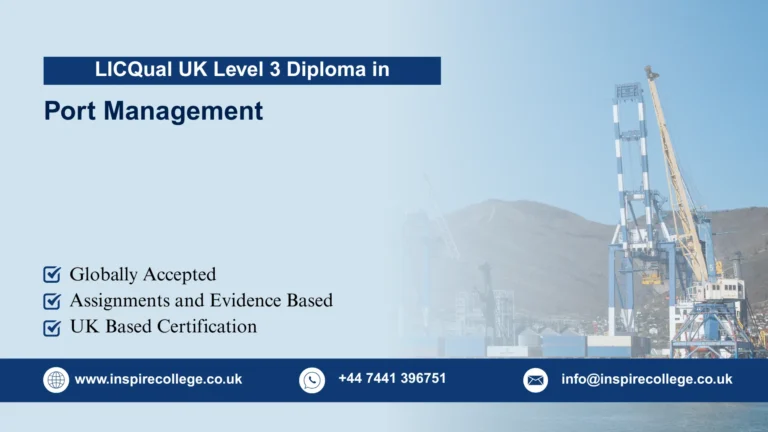
ICTQual AB Level 6 International Diploma in Urban Planning & Smart Cities
The ICTQual AB Level 6 International Diploma in Urban Planning & Smart Cities is a comprehensive program designed to equip learners with the advanced skills and knowledge required to plan, design, and manage modern urban environments. In today’s rapidly evolving cities, expertise in sustainable urban development, smart infrastructure, and digital planning tools is essential for creating livable, efficient, and technologically integrated communities. This diploma prepares learners to meet the challenges of urbanization, population growth, and environmental sustainability.
This three-year program, totaling 360 credits, is suitable for both freshers and working professionals seeking internationally recognized qualifications in urban planning and smart city development. Learners will gain in-depth knowledge of urban design principles, sustainable development strategies, geographic information systems (GIS), transportation planning, and smart city technologies. Through a combination of theoretical instruction, case studies, and real-world projects, participants develop the ability to analyze urban environments, implement innovative planning solutions, and manage complex city development projects effectively.
Graduates of this program will acquire strong analytical, technical, and managerial skills, enabling them to contribute to the design and implementation of smart city initiatives, sustainable urban infrastructure, and integrated city planning projects. The diploma emphasizes ethical practices, environmental responsibility, and innovative problem-solving, ensuring learners are prepared to meet global industry standards. This certification is British Council verifiable, MOFA and Embassy attestable, providing international recognition and enhancing career prospects. Whether starting a career or advancing professionally, learners will gain the expertise, practical experience, and credentials necessary to excel as urban planning and smart city specialists.
The ICTQual AB Level 6 International Diploma in Urban Planning & Smart Cities is designed for learners who aspire to excel in urban development, smart infrastructure, and city management. The entry requirements ensure candidates are fully prepared for advanced learning and practical applications.
- Age Requirements: Applicants must be at least 18 years old at the time of enrolment.
- Educational Requirements: Candidates should hold a Level 5 Diploma, Higher National Diploma (HND), or equivalent in urban planning, civil engineering, architecture, environmental studies, or related fields. Freshers with strong foundational knowledge may also be considered.
- Professional Experience: While not mandatory, applicants with 1–2 years of relevant work experience in urban planning, civil engineering, or smart city projects are encouraged to apply.
- English Language Proficiency: Learners must demonstrate proficiency in English through IELTS (5.5 or above), TOEFL, or an equivalent to effectively engage with course materials and assessments.
- Related Courses: This diploma complements other ICTQual AB programs such as the Level 6 International Diploma in Architecture & Design and the Level 6 International Diploma in Building Information Modelling (BIM), providing a clear pathway for career advancement.
By fulfilling these entry requirements, learners will be well-prepared to succeed in the program, gain globally recognized credentials, and advance their careers in urban planning, smart city development, and sustainable infrastructure management.
Mandatory Units
This qualification, the ICTQual AB Level 6 International Diploma in Urban Planning & Smart Cities, consists of 36 mandatory units:
Year 1 – Foundation in Urban Planning & Smart Cities
- Principles of Urban Planning and Smart Cities
- Introduction to Urban Development Projects
- Construction Materials and Methods in Urban Infrastructure
- Spatial Planning and Design Principles
- Project Planning and Scheduling in Urban Projects
- Health, Safety, and Environmental Awareness
- Communication and Stakeholder Management in Urban Planning
- Digital Tools and Construction Technology Fundamentals
- Financial Management in Urban Projects
- Quality Assurance and Control in Urban Development
- Legal and Regulatory Frameworks in Urban Planning
- Professional Ethics and Conduct in Planning
Year 2 – Intermediate Urban Planning & Smart Cities Practices
- Advanced Urban Design and Planning Techniques
- Resource Management and Allocation in Projects
- Project Cost Estimation and Budgeting in Urban Development
- Construction Contract Administration
- Procurement and Supply Chain Management in Urban Projects
- Project Risk Analysis and Mitigation
- Leadership and Team Management in Urban Planning
- Site and Infrastructure Management
- Sustainable Development and Environmental Management
- Project Monitoring and Reporting
- Problem-Solving and Decision-Making in Urban Projects
- Communication and Negotiation Skills in Planning
Year 3 – Advanced Urban Planning & Strategic Leadership
- Strategic Urban Planning and Smart City Management
- Advanced Infrastructure and Project Planning
- Urban Transport and Mobility Systems Management
- Innovation and Emerging Technologies in Smart Cities
- Advanced Risk and Crisis Management in Urban Projects
- Contract Management and Legal Compliance
- Leadership in Urban Planning Projects
- Advanced Project Control and Performance Measurement
- Project Governance and Compliance in Smart City Projects
- Research Methods and Project Analysis in Urban Planning
- Capstone Project in Urban Planning & Smart Cities
- Professional Development and Career Planning
The ICTQual AB Level 6 International Diploma in Urban Planning & Smart Cities equips learners with advanced skills, knowledge, and practical expertise to plan, design, and manage sustainable urban environments and smart city projects. Graduates will be able to apply strategic, technical, and managerial competencies to address modern urban challenges and deliver innovative solutions.
Year 1 – Foundation in Urban Planning & Smart Cities
Principles of Urban Planning and Smart Cities
- Understand fundamental concepts and principles of urban planning and smart city development.
- Apply theoretical frameworks to analyze urban environments and planning challenges.
- Evaluate global trends and best practices in urban development.
- Demonstrate knowledge of sustainable and innovative city planning approaches.
Introduction to Urban Development Projects
- Identify the stages of urban development projects from concept to completion.
- Develop initial project proposals and feasibility studies.
- Apply basic project management techniques in urban planning contexts.
- Demonstrate understanding of interdisciplinary collaboration in project execution.
Construction Materials and Methods in Urban Infrastructure
- Identify key materials and methods used in urban infrastructure projects.
- Evaluate material performance and suitability for different urban applications.
- Apply practical problem-solving skills in construction and design contexts.
- Integrate knowledge of sustainable construction practices.
Spatial Planning and Design Principles
- Apply design principles to optimize urban spaces for functionality and aesthetics.
- Develop layouts considering zoning, land use, and population needs.
- Integrate accessibility, environmental, and social considerations into planning.
- Critically evaluate design alternatives to ensure optimal outcomes.
Project Planning and Scheduling in Urban Projects
- Develop detailed project plans and schedules using standard tools.
- Allocate resources and manage timelines effectively.
- Monitor project progress and adjust plans as required.
- Evaluate planning strategies for efficiency and cost-effectiveness.
Health, Safety, and Environmental Awareness
- Understand safety regulations and environmental standards in urban projects.
- Apply safe practices in planning and project execution.
- Assess environmental impacts and implement mitigation measures.
- Integrate sustainability principles into urban development projects.
Communication and Stakeholder Management in Urban Planning
- Communicate project objectives effectively with stakeholders.
- Prepare professional reports, presentations, and visualizations.
- Facilitate collaboration among multidisciplinary teams.
- Resolve conflicts and ensure stakeholder satisfaction.
Digital Tools and Construction Technology Fundamentals
- Apply digital tools and software in urban planning and design.
- Understand construction technologies for smart infrastructure projects.
- Evaluate technology adoption for efficiency and quality improvement.
- Integrate digital solutions into project planning and management.
Financial Management in Urban Projects
- Prepare budgets and financial plans for urban development projects.
- Monitor expenditures and control costs effectively.
- Analyze financial performance to support project decisions.
- Apply cost-benefit analysis for sustainable urban solutions.
Quality Assurance and Control in Urban Development
- Implement quality standards in planning and construction projects.
- Monitor compliance with project specifications and regulations.
- Conduct inspections and evaluations to ensure quality outcomes.
- Apply corrective measures to address quality deficiencies.
Legal and Regulatory Frameworks in Urban Planning
- Understand laws, regulations, and codes relevant to urban planning.
- Ensure compliance with zoning, construction, and safety regulations.
- Apply legal principles in project management and urban development.
- Demonstrate awareness of professional and ethical responsibilities.
Professional Ethics and Conduct in Planning
- Apply ethical principles in professional planning practice.
- Demonstrate integrity and accountability in decision-making.
- Promote responsible and sustainable urban development.
- Foster ethical collaboration among project teams.
Year 2 – Intermediate Urban Planning & Smart Cities Practices
Advanced Urban Design and Planning Techniques
- Apply advanced design methods to complex urban environments.
- Develop detailed plans for residential, commercial, and public spaces.
- Evaluate feasibility, sustainability, and social impact of designs.
- Integrate innovative solutions into planning projects.
Resource Management and Allocation in Projects
- Allocate resources efficiently for urban development projects.
- Monitor utilization of materials, labor, and technology.
- Optimize workflows to reduce waste and improve efficiency.
- Evaluate resource management strategies for effectiveness.
Project Cost Estimation and Budgeting in Urban Development
- Prepare detailed cost estimates for urban projects.
- Apply budgeting techniques to manage project finances.
- Monitor expenditures and implement cost-control measures.
- Analyze variances between estimated and actual costs.
Construction Contract Administration
- Understand contractual obligations in urban development projects.
- Administer contracts between clients, contractors, and suppliers.
- Resolve disputes and enforce contract compliance.
- Apply legal principles to support contract management.
Procurement and Supply Chain Management in Urban Projects
- Plan and manage procurement processes effectively.
- Evaluate suppliers and manage vendor relationships.
- Ensure timely delivery of materials and services.
- Integrate supply chain strategies into urban project planning.
Project Risk Analysis and Mitigation
- Identify potential risks in urban planning projects.
- Develop and implement mitigation and contingency plans.
- Monitor risk management effectiveness.
- Evaluate risk impact on project outcomes and decision-making.
Leadership and Team Management in Urban Planning
- Lead multidisciplinary teams effectively.
- Motivate team members and resolve conflicts.
- Monitor team performance and implement improvements.
- Apply leadership strategies to achieve project objectives.
Site and Infrastructure Management
- Manage urban infrastructure sites and workshops efficiently.
- Ensure adherence to safety, quality, and schedule standards.
- Coordinate activities between planning and on-site teams.
- Evaluate operational efficiency and implement improvements.
Sustainable Development and Environmental Management
- Integrate sustainability principles into urban planning projects.
- Assess environmental impacts and implement eco-friendly solutions.
- Apply energy-efficient and green infrastructure practices.
- Promote long-term environmental responsibility in projects.
Project Monitoring and Reporting
- Track project progress and performance metrics.
- Prepare detailed reports for stakeholders.
- Use monitoring tools to ensure timelines and budgets are met.
- Evaluate project outcomes to recommend improvements.
Problem-Solving and Decision-Making in Urban Projects
- Analyze complex challenges and propose innovative solutions.
- Apply structured decision-making techniques in planning contexts.
- Implement corrective actions effectively.
- Demonstrate critical thinking in urban development projects.
Communication and Negotiation Skills in Planning
- Communicate ideas clearly and persuasively to stakeholders.
- Negotiate contracts, resources, and timelines effectively.
- Resolve conflicts while maintaining professional relationships.
- Prepare professional documentation to support communication.
Year 3 – Advanced Urban Planning & Strategic Leadership
Strategic Urban Planning and Smart City Management
- Develop long-term urban planning strategies aligned with city objectives.
- Apply smart city frameworks to optimize urban infrastructure.
- Monitor performance metrics to ensure project success.
- Implement strategies for sustainable and efficient urban growth.
Advanced Infrastructure and Project Planning
- Plan large-scale urban and infrastructure projects effectively.
- Apply advanced scheduling and resource allocation techniques.
- Monitor progress and adjust plans to meet objectives.
- Evaluate planning strategies for efficiency and sustainability.
Urban Transport and Mobility Systems Management
- Design and manage integrated urban transport systems.
- Analyze mobility patterns and optimize transport infrastructure.
- Implement sustainable and smart mobility solutions.
- Evaluate performance and improve transport efficiency.
Innovation and Emerging Technologies in Smart Cities
- Integrate digital technologies and IoT in urban projects.
- Apply smart solutions to optimize city management.
- Evaluate emerging technologies for efficiency and sustainability.
- Foster innovation in planning and infrastructure management.
Advanced Risk and Crisis Management in Urban Projects
- Identify and assess complex project risks and crises.
- Develop proactive mitigation and response strategies.
- Lead teams effectively during crises.
- Monitor and adjust risk strategies for continuous improvement.
Contract Management and Legal Compliance
- Manage complex contracts in urban planning projects.
- Ensure compliance with regulations, codes, and ethical standards.
- Resolve legal and contractual issues efficiently.
- Apply professional judgment in contract administration.
Leadership in Urban Planning Projects
- Lead multidisciplinary teams on complex urban projects.
- Apply advanced leadership techniques for motivation and conflict resolution.
- Evaluate team performance and implement improvements.
- Demonstrate ethical and effective leadership in planning projects.
Advanced Project Control and Performance Measurement
- Monitor project performance using advanced tools and KPIs.
- Ensure alignment with budget, schedule, and quality objectives.
- Implement corrective actions to maintain project goals.
- Evaluate outcomes for continuous improvement.
Project Governance and Compliance in Smart City Projects
- Apply governance frameworks to urban and smart city projects.
- Ensure compliance with legal, regulatory, and ethical standards.
- Develop accountability structures within project teams.
- Evaluate governance practices for effective project oversight.
Research Methods and Project Analysis in Urban Planning
- Apply research methodologies to analyze urban planning challenges.
- Conduct data-driven evaluations to support decisions.
- Prepare professional reports and analyses.
- Integrate research findings into practical urban solutions.
Capstone Project in Urban Planning & Smart Cities
- Plan, design, and execute a comprehensive urban project.
- Apply knowledge, skills, and tools acquired throughout the program.
- Produce professional documentation, models, and presentations.
- Demonstrate competency in urban planning, project management, and smart city implementation.
Professional Development and Career Planning
- Develop a personal roadmap for career growth in urban planning and smart cities.
- Identify opportunities for specialization and continued professional development.
- Reflect on personal strengths, skills, and achievements.
- Prepare for leadership roles and internationally recognized certification.
The ICTQual AB Level 6 International Diploma in Urban Planning & Smart Cities is specifically designed for ambitious learners who are eager to advance their careers in urban development, smart city management, and sustainable infrastructure planning. This programme caters to professionals who want to gain practical skills, strategic insight, and technological expertise to shape the cities of the future.
1. Professional Background
- Graduates and Professionals: Individuals with a background in architecture, civil engineering, urban design, environmental planning, or related disciplines will find this course particularly valuable.
- Career Changers: Professionals from other sectors who are motivated to transition into urban planning, smart city consultancy, or infrastructure management will benefit from the structured learning and applied knowledge provided by this diploma.
- Emerging Leaders: Those looking to enhance their qualifications and credibility for senior roles in urban development or municipal management.
2. Key Interests
- Sustainable Urban Development: Learners should have a strong passion for designing environmentally sustainable cities that optimise resources and enhance quality of life.
- Smart City Technologies: Interest in implementing innovative digital solutions, IoT, and data-driven strategies to improve urban efficiency and connectivity.
- Urban Improvement: A desire to contribute to better city living standards, effective transport systems, green spaces, and smart infrastructure solutions.
- Technology Integration: Enthusiasm for combining technology, planning principles, and analytics to develop smarter, more efficient urban environments.
3. Skills and Attributes
- Analytical Thinking: Ability to assess complex urban challenges, interpret data, and develop practical solutions.
- Problem-Solving: Capacity to identify urban development issues and propose innovative, technology-driven interventions.
- Project Management: Strong organisational, communication, and leadership skills to manage multi-disciplinary projects successfully.
- Policy Understanding: Knowledge of urban planning regulations, compliance frameworks, and smart city strategies to inform decision-making.
- Collaboration: Ability to work effectively with engineers, planners, policymakers, and technology experts to deliver sustainable urban projects.
4. Career Goals
- Leadership Roles: Aspiring to senior positions in municipal planning, urban policy development, and smart city project management.
- Project Implementation: Seeking opportunities to lead urban development projects, infrastructure initiatives, or sustainability programs.
- Practical Expertise: Keen to gain hands-on experience in urban systems analysis, data-driven planning, and the deployment of innovative smart city solutions.
- Impact-Driven Careers: Motivated to make a tangible impact on urban living, community well-being, and environmental sustainability.
By completing this Level 6 diploma, learners will acquire a comprehensive understanding of urban planning principles, smart city frameworks, sustainable development practices, and digital innovation. Graduates will be fully equipped to design, manage, and implement city-wide projects that enhance urban life, support sustainable growth, and drive technological transformation in modern cities.
As an ICTQual AB Approved Training Centre, we offer learners two pathways to achieve the Level 6 International Diploma in Urban Planning & Smart Cities. All students must register with us to enrol for certification.
Route 1: For Experienced Professionals
This route is tailored for candidates with at least 6 years of verifiable professional experience in urban planning, smart city projects, infrastructure development, or related fields.
Process:
- Eligibility: Candidates must provide proof of a minimum of six years’ relevant professional experience.
- Assessment of Competence: Our centre evaluates whether the learner’s existing skills and experience meet the learning outcomes of the qualification.
- Evidence Submission: Learners submit documentation of projects, responsibilities, and achievements demonstrating competence in urban planning, project management, and smart city solutions.
- Knowledge Verification: Any gaps in knowledge are identified, and targeted support or guidance is provided.
- Certification: Upon successful verification, candidates are awarded the ICTQual AB Level 6 International Diploma in Urban Planning & Smart Cities without needing to complete the full 36 assignments.
This route is ideal for professionals seeking to validate their expertise and fast-track their certification.
Route 2: For Fresh Candidates
This route is designed for new learners or those without prior work experience in urban planning or smart city management.
Process:
- Registration: Students must enrol with our ICTQual AB Approved Training Centre and meet the standard entry requirements, including educational background and language proficiency.
- Training: Learners complete the full programme, including all 36 assignments, covering all study units through lectures, practical exercises, and project-based learning.
- Assessment: Assignments, projects, and case studies are submitted to demonstrate knowledge, application, and problem-solving skills aligned with course learning outcomes.
- Certification: Upon successful completion of all 36 assignments and assessments, learners are awarded the ICTQual AB Level 6 International Diploma in Urban Planning & Smart Cities.
This route ensures learners gain comprehensive theoretical knowledge and practical skills required to build a career in urban planning and smart city management.
Both routes provide a globally recognised, industry-relevant qualification, enabling learners to either leverage their professional experience or build a strong foundation from scratch.
Register Now
FAQs for ICTQual AB Level 6 International Diploma in Urban Planning & Smart Cities






